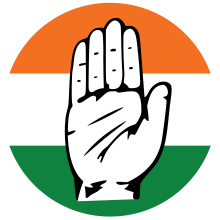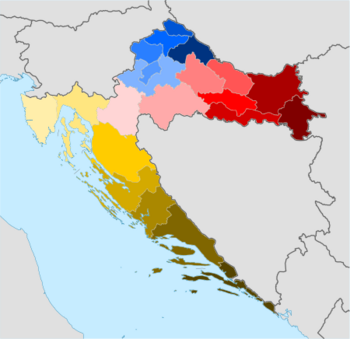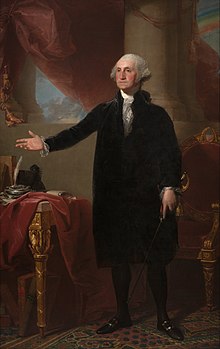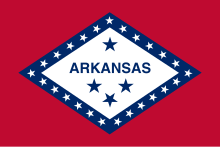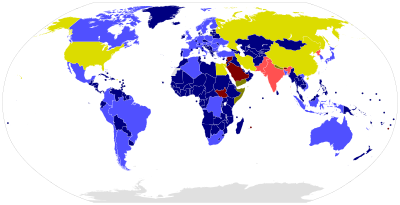| Main | Topics and categories | Tasks and projects |
The Politics portal
Politics (from Ancient Greek πολιτικά (politiká) 'affairs of the cities') is the set of activities that are associated with making decisions in groups, or other forms of power relations among individuals, such as the distribution of resources or status. The branch of social science that studies politics and government is referred to as political science.
It may be used positively in the context of a "political solution" which is compromising and non-violent, or descriptively as "the art or science of government", but also often carries a negative connotation. The concept has been defined in various ways, and different approaches have fundamentally differing views on whether it should be used extensively or in a limited way, empirically or normatively, and on whether conflict or co-operation is more essential to it.
A variety of methods are deployed in politics, which include promoting one's own political views among people, negotiation with other political subjects, making laws, and exercising internal and external force, including warfare against adversaries. Politics is exercised on a wide range of social levels, from clans and tribes of traditional societies, through modern local governments, companies and institutions up to sovereign states, to the international level.
In modern nation states, people often form political parties to represent their ideas. Members of a party often agree to take the same position on many issues and agree to support the same changes to law and the same leaders. An election is usually a competition between different parties.
A political system is a framework which defines acceptable political methods within a society. The history of political thought can be traced back to early antiquity, with seminal works such as Plato's Republic, Aristotle's Politics, Confucius's political manuscripts and Chanakya's Arthashastra. (Full article...)
Selected article
The Cultural Revolution Group (CRG) (Chinese: 中央文革小组) was formed in May 1966 as a replacement organisation to the Central Committee Secretariat and the "Five Man Group", and was initially directly responsible to the Standing Committee of the Politburo. It consisted mainly of radical supporters of Mao, including Chen Boda, the Chairman's wife Jiang Qing, Kang Sheng, Yao Wenyuan, Zhang Chunqiao, Wang Li and Xie Fuzhi. The CRG had a central role to play in the Cultural Revolution's first few years, and for a period of time the group replaced the Politburo Standing Committee (PSC) as the de facto top power organ of China. Its members were also involved in many of the major events of the Cultural Revolution.
Featured picture

Xi Jinping (pronounced [ɕǐ tɕînpʰǐŋ], Chinese: 习近平; born 15 June 1953) is the General Secretary of the Communist Party of China, China's "paramount leader".
Selected quote
Selected biography
Richard Nixon (1913–1994) was the 37th President of the United States, serving from 1969 to 1974. He graduated from Whittier College in 1934 and Duke University School of Law in 1937, returning to California to practice law. He served in the United States Navy during World War II. Nixon was elected to the House of Representatives in 1946 and to the Senate in 1950. He served for eight years as vice president, from 1953 to 1961, and waged an unsuccessful presidential campaign in 1960, narrowly losing to John F. Kennedy. In 1968, Nixon ran again for president and was elected. He initially escalated the Vietnam War, but ended U.S. involvement in 1973. Nixon's visit to the People's Republic of China in 1972 opened diplomatic relations between the two nations. Though he presided over Apollo 11, he scaled back manned space exploration. He was re-elected by a landslide in 1972. A series of revelations in the Watergate scandal cost Nixon much of his political support in his second term, and on August 9, 1974, he resigned as president. In retirement, Nixon's work as an elder statesman, authoring several books and undertaking many foreign trips, helped to rehabilitate his public image.
Did you know (auto-generated) -

- ... that politics in The Simpsons have caused controversy in Argentina, Australia, Brazil, and Japan?
- ... that the British political theorist Chris Armstrong has called for a "blue new deal" to secure ecological resilience for the ocean and a just blue economy?
- ... that Dante used the third circle of hell to discuss contemporary Florentine politics rather than the sin of gluttony?
- ... that Jonathan Allen left journalism for politics before quitting 40 days later?
- ... that Satrio Sastrodiredjo and Moerachman, both former mayors of Surabaya, Indonesia, were held as political prisoners in the same prison after the 30 September Movement in 1965?
- ... that after its merger with India, the last raja of Jubbal State joined the Indian Foreign Service?
More did you know...
- ...that the Voting Rights Act of 1965 banned literacy tests as a voting qualification in the U.S.?
- ...that "Tippecanoe and Tyler too" (campaign banner pictured) was called the "Marseillaise" of the 1840 United States presidential election?
- ...that the events of Polish October together with Hungarian November shook the Eastern Bloc in 1956 and set the course for the Revolutions of 1989?
- ...that the current constitution of Nicaragua, the ninth in the country's history, was the final step in the institutionalization of the Sandinista regime?
- ...that depending on a time and place, the same social movement may be revolutionary or not?
- ...that during the Sixth Congress of the Cuban Communist Party, Raúl Castro proposed term limits for the country's leaders?
In this month
- May 5, 2005 – A General Election in the United Kingdom sees Tony Blair's Labour government returned to office with a reduced majority of 66.
- May 14, 1948 – The Declaration of Independence of Israel is made.
- May 18, 1948 – The first Legislative Yuan of the Republic of China officially convenes in Nanking.
News and Current events
- August 11: 4 local government areas in New South Wales, Australia locked down after COVID-19 case
- August 11: Australia: AstraZeneca vaccine access expanded by Victorian government
- August 1: Australia: Victorian lockdown lifted
- July 29: Tunisia's president dismisses prime minister, suspends parliament
- July 25: Australia: Wikinews interviews Reg Kidd, mayor of the City of Orange, about COVID-19 lockdown and local government
- July 23: South Australia enters week-long lockdown to contain COVID-19 Delta variant spread
- July 21: Technological University Dublin senior lecturer Dr Lorcan Sirr speaks to Wikinews on housing market in Ireland
- July 21: Three rural councils in New South Wales, Australia enter 7-day lockdown
- July 21: Australia: Victoria lockdown extended by a week with 85 active cases recorded
- July 15: California governor signs new state budget, eligible Californians to get stimulus payments
Topics and categories
General images
Related portals
Associated Wikimedia
The following Wikimedia Foundation sister projects provide more on this subject:
-
Commons
Free media repository -
Wikibooks
Free textbooks and manuals -
Wikidata
Free knowledge base -
Wikinews
Free-content news -
Wikiquote
Collection of quotations -
Wikisource
Free-content library -
Wikiversity
Free learning tools -
Wiktionary
Dictionary and thesaurus


